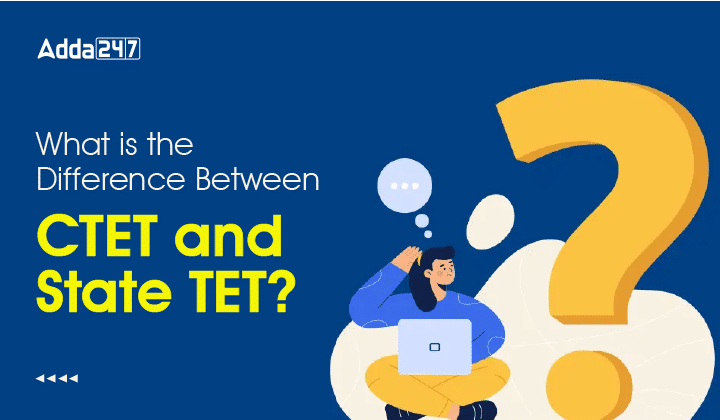Table of Contents
What is the difference between CTET and State TET? This question arises by aspirants who are preparing for the TET examination. The state TET exam and Central TET Exam, both are Teaching eligibility Tests for candidates who want to choose Teaching as their profession. Candidates who belong to a particular state will always confuse about TET exam. Which exam will be given for a teaching job i.e. CTET or State TET? Here we are going to explain CTET and State TET Exam benefits, and the difference to help candidates in TET Exam Preparation.
What is CTET?
CTET stands for the Central Teacher Eligibility Test, which is a national-level examination conducted by the Central Board of Secondary Education (CBSE) in India. The CTET exam is conducted to assess the eligibility of candidates who want to become teachers in various central government schools, including Kendriya Vidyalayas and Jawahar Navodaya Vidyalayas, as well as schools under the administrative control of the Union Territories.
What is State TET?
Aspiring teachers in India must pass the Teacher Eligibility Test (TET), a mandatory qualifying exam administered by the respective state government. This state-level assessment, also known as the State TET, evaluates candidates’ qualifications and suitability for teaching positions in primary and upper primary schools within the state. The TET is conducted by the respective State Education Board to ensure that aspiring teachers possess the necessary skills and knowledge to effectively educate students at these levels.
CTET Vs TET Exam Bodies
In the following table, candidates will find more information on the different TET exams and their Exam Conducting Bodies. The CTET is conducted by CBSE on a national level. The State TET exams are conducted by various State Exam Conducting Boards on a state-level.
| Name of Exam | Level | Exam Conducting Body |
| Central Teacher Eligibility Test (CTET) | National | Central Board of Secondary Education (CBSE) |
| Uttar Pradesh Teacher Eligibility Test (UPTET) | State | Uttar Pradesh Exam Regulatory Authority on behalf of the Uttar Pradesh Basic Education Board (UPBEB) |
| Bihar State Teacher Eligibility Test (BSTET) | State | Bihar School Examination Board (BSEB) |
| Maharashtra Teacher Eligibility Test (MAHA TET) | State | Maharashtra State Council of Examination (MSCE) |
| Odisha Teacher Eligibility Test (OTET) | State | BSE Odisha |
| Tamil Nadu Teacher Eligibility Test (TNTET) | State | Teachers Recruitment Board, Tamil Nadu |
| Himachal Pradesh Teacher Eligibility Test (HPTET) | State | Himachal Pradesh Board of School Education (HPBOSE) |
| Chhattisgarh Teacher Eligibility Test (CG TET) | State | CG Vyapam or CPEB |
| Odisha Secondary School Teacher Eligibility Test (OSSTET) | State | BSE Odisha |
| Meghalaya Teacher Eligibility Test (MTET) | State | Directorate of Educational Research & Training (DERT) |
| Madhya Pradesh Teacher Eligibility Test (MP TET) | State | MP Vyapam or MPPEB |
| Karnataka Teachers Eligibility Test (KARTET) | State | State Education Board of Karnataka |
| Rajasthan Eligibility Examination for Teacher (REET) | State | Board of Secondary Education, Rajasthan (RBSE) |
| Kerala Teacher Eligibility Test (KTET) | State | Kerala Pareeksha Bhavan |
| West Bengal Teacher Eligibility Test (WBTET) | State | West Bengal Board of Primary Education (WBBPE) |
| Andhra Pradesh Teacher Eligibility Test (APTET) | State | Department of School Education, Government of AP |
| Tripura Teacher Eligibility Test (T-TET) | State | Teachers Recruitment Board, Tripura |
| Telangana State Teacher Eligibility Test (TSTET) | State | Department of School Education, the Government of Telangana |
| Bihar Teacher Eligibility Test (BTET) | State | Bihar School Examination Board (BSEB) |
| Punjab State Teacher Eligibility Test (PSTET) | State | Punjab School Education Board (PSEB) |
| Haryana Teacher Eligibility Test (HTET) | State | Haryana Board of School Education (BSEH) |
| Uttarakhand Teacher Eligibility Test (UTET) | State | Uttarakhand Board of School Education (UBSE) |
What is the difference between CTET and TET?
Two major exams conducted each year for aspirants of the teaching profession include CTET & State TET. The CTET exam is one of the eligibility tests conducted by the central board of secondary education. It helps the candidates to get selected for the profession of teacher for government schools like Kendriya Vidyalaya and Navodaya Vidyalaya. After qualifying the TET Exam candidates get the certificate, and they can easily apply for State govt. school vacancies. Therefore, if you need to secure a job in KVS or any central govt school like DSSSB, then you need to qualify CTET Exam.
However, the TET exams are conducted by the state government of the particular state. Through TET, candidates can secure teaching jobs in government schools run by state governments only. Candidates are not eligible to apply for teaching jobs in central schools such as KVS, DSSSB and NVS. For example, if you wish to get a job in the Rajasthan State Govt. School, you will be required to qualify for the REET Exam or Rajasthan TET Exam.
Major Points of Difference CTET Vs TET
In the following table, candidates will find the major points of difference between CTET Vs State TET exams. There are many differences scope of exam, exam- level, application process and so on. Read on to know more about the difference between CTET and State TET.
| Major points | CTET | State TET |
| Conducting body of the exam | It gets held by the CBSE from the side of the central government. | It gets done by the different state government education boards |
| All Exam notifications | It gets conducted twice a year. | It gets undertaken according to the validity of vacancies in the state government schools. |
| Age limit for exams | There is no upper age limit | It consists of age criteria according to the different posts of teachers. |
| The primary medium of paper | A CTET exam is entirely comfortable in every language. | TET exam requires essential fluency in the state language. |
| Teaching jobs | The job gets secured in central government schools. | The posts get secured in state government schools. |
| Validation of certificate | The CTET exam gets certified for life time. | Validation of the certificate depends up on the state govt education board. |
| A fee of the application form | The single paper of CTET consists of Rs. 1000. However, you have to pay Rs. 1200 for both exams. | The application fee varies according to the state. |
CTET and State TET Exam Pattern
CTET and State TET Paper 1 and paper 2 varies as per the subjects chosen by the candidates. Each question carries four multiple choices and you have to select one correct option. Paper-1 consists of five different sections, and Paper-2 consists of four different parts. Each part of the paper-1 consists of 30 questions and paper-2 contains every three divisions with 30 queries. However, one part of the paper-2 contains 60 questions according to the specified subject.
Note: In Some State, TET exam is not same as CTET it may be vary according to the state tet notification
| Generic Exam Pattern –CTET & TET 2023 | |||||
| Paper | Name of Subject | Number of Questions | Paper | Name of Subject | Number of Questions |
| PAPER –I (class I- class V) | Child Development and Pedagogy | 30 | PAPER –II (class VI- class VIII) | Child Development and Pedagogy | 30 |
| Language I (compulsory) and Subject concerned Pedagogy | 30 | Language I (compulsory) and Subject concerned Pedagogy | 30 | ||
| Language II (compulsory) and Subject concerned Pedagogy | 30 | Language II (compulsory) and Subject concerned Pedagogy | 30 | ||
| Mathematics and Subject concerned Pedagogy | 30 | Mathematics & Science and Subject concerned Pedagogy OR Social Studies/Social Science and Subject concerned Pedagogy |
60 | ||
| Environmental Studies and Subject concerned Pedagogy | 30 | ||||
| Total Marks | 150 | Total Marks | 150 | ||
| Negative marking | No | Negative marking | No | ||
Question Paper Highlights of the CTET and TET
Mainly, the exam pattern of the CTET and TET exams consists of the same design. Both the exams include paper-1 and paper-2 mode; you can apply for both exams with the required qualification. If you want to become a primary teacher, then you must go for paper-1. However, you should go for paper-2 if you want to join a secondary teacher.
| Particulars | Paper-1 of CTET and TET exam | Paper-2 of CTET and TET exam |
| Mode of exam | It is an offline mode exam and gets conducted on the OMR sheet. | It is also an offline-based exam and gets held on the OMR sheet. |
| Type of the question | The CTET and TET exam consists of multiple-choice questions. | The CTET and TET exams consist of multiple-choice questions. |
| Duration of both exams | Total 150 minutes. | It is a of total 150 minutes. |
| Marks of both exams | 150 marks | 150 marks |
| Marking Scheme | Each question carries one mark. | Each question carries one mark. |
| Negative Marking | There is no negative marking for both exam. | There is no negative marking for the CTET and TET exams. |
Career Prospect After CTET & State TET
The candidates who are appearing or planning in the upcoming CTET or State TET Examinations, need to clear their minds, there is a number of job opportunities in the future. As DSSSB, NVS has released many teaching vacancies, and other states have also released TGT PRT PGT Recruitment. CTET 2023 has also been released on the official website. This is a golden opportunity for candidates who want to secure government teaching jobs. Once you qualify for the CTET and State TET exam, you are eligible to apply for PRT, TGT and PGT posts in Central Government Schools such as Kendriya Vidyalaya School, DSSSB & Navodaya Samiti Schools.



 UPHESC Assistant Professor Question Pape...
UPHESC Assistant Professor Question Pape...
 Is the CSIR NET Exam Tough? Know the Dif...
Is the CSIR NET Exam Tough? Know the Dif...
 Tips & Strategies to Prepare for CSI...
Tips & Strategies to Prepare for CSI...














